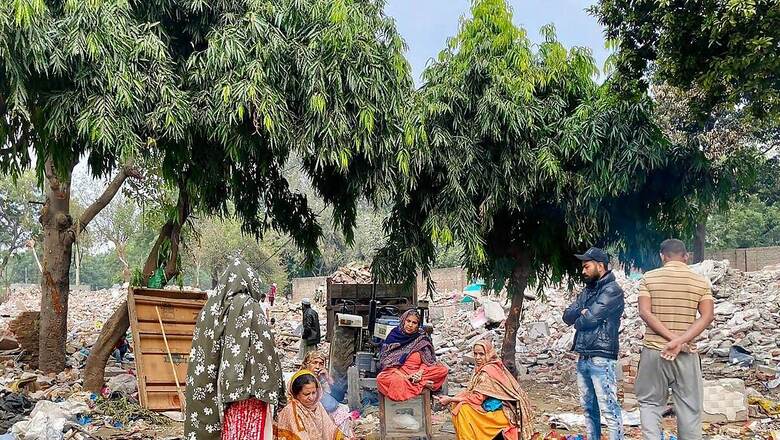
views
The Narendra Modi government has been doing a commendable job in infrastructure building, spending lakhs of crores every year on roads, ports, etc. Equally admirable is its fiscal conservatism which has resulted in declining fiscal and revenue deficits. It is rightly focused on the big picture. The same, however, cannot be said about the ‘small picture’, which is the prerequisite change at the local level. The local remains problematic, be it Sandeshkhali village in West Bengal or Banbhoolpura area of Haldwani or Noida in Uttar Pradesh.
Governments come and go, the fortunes of political parties ebb and flow, but roughnecks and land grabbers continue to flourish all across the country. Since politicians at the state and district levels are party and ideology-agnostic, they keep changing their affiliations as per their convenience.
Trinamool Congress (TMC) strongman Sheikh Shahjahan, who is accused of several crimes, worked for the Communist Party of India (Marxist) when the Left Front held power in West Bengal. At that time, his uncle was a local CPM leader. Now that the TMC is in power, he is with the ruling party in the state.
It was Shahjahan in Sandeshkhali and Shrikant Tyagi in UP’s Noida one and a half years ago. The TMC leader was allegedly involved not just in a land grab but also in a big scam. He has also been accused of misdemeanour with several women. Tyagi, who claimed to be the national executive member of the Bharatiya Janata Party’s Kisan Morcha, was also accused of encroachment. When confronted by a lady over encroachment, he abused her. In the riots in the Banbhoolpura area of Uttarakhand’s Haldwani, a local Samajwadi Party politician’s role has been alleged.
Apart from power, which these people try to stick to, they are obsessed with land. They know from experience what Scarlett O’Hara learnt from her father Gerald in ‘Gone With the Wind’: land is the only thing in the world worth working for, worth fighting for, worth dying for, because it’s the only thing that lasts.
Encroachments take place all over the country, including in the heart of the national capital. On February 7, the Delhi High Court asked the Municipal Corporation of Delhi (MCD) if it had taken any action regarding “unauthorised construction” at a sealed property near Nizamuddin Ki Baoli and Barakhamba Tomb. The Archaeological Survey of India (ASI) and Delhi Police brought the illegal construction to the notice of MCD officials in October last year. A division bench of Acting Chief Justice Manmohan and Justice Manmeet Pritam Singh Arora orally said to a senior MCD official that the high court “took cognizance of the matter in January. ASI made a statement that they brought it to your notice in December last year. What has your department done since October and who is the person who dealt with it since then?”
The MCD is not alone that can be berated for its lackadaisical attitude; almost all local authorities have a similar attitude towards any issue of public importance. Even if some publicly-spirited individual or organisation tries ‘to be the change they want to see,’ they face a lukewarm response, if not downright hostility, from the officials concerned. Ineptitude, sloth, and venality plague the authorities that the man on the street comes in contact with.
In short, the small picture is ugly; and since a zillion small pictures ultimately make the big picture, it would be unreasonable to hope that policy initiatives at the top level will automatically percolate downwards.
Consider the case of travel and tourism. “PM Modi is the greatest brand ambassador for Indian tourism, not just Lakshadweep,” Federation of Hotel & Restaurant Associations of India secretary general, Jaison Chacko, told me a few weeks ago. Modi’s 2019 Independence Day speech had urged the people to try and visit at least 15 tourist destinations within the country by 2022. This not only gave a fillip to domestic tourism but also stood the sector in good stead in the post-Covid period.
Modi’s recent praise of Lakshadweep, and the controversy arising out of three Maldivian ministers’ intemperate remarks against India and him, also attracted the attention of a lot of Indians towards the Indian island. But Lakshadweep, or any other place, cannot be developed as a tourist destination if the law and order situation is bad there, there is a lack of cleanliness, encroachments are rampant, and clogged streets restrict smooth movement. India’s infinite tourism potential can never be tapped unless the local issues are addressed in earnest.
In some measure or the other, the same is true for every other sector.
Improvement in local administration, however, is predicated upon a great deal of work that, it is believed, may not be electorally rewarding for political parties. This is the reason that not many leaders are interested in it; as mentioned earlier, many of them indeed benefit from the status quo.
The Modi government should try to ensure that the beneficiaries of the status quo don’t erode the gains of economic development at the local level. At least, it can rein in the wayward local leaders in the states ruled by the BJP.
The author is a freelance journalist. Views expressed in the above piece are personal and solely those of the writer. They do not necessarily reflect News18’s views.




















Comments
0 comment